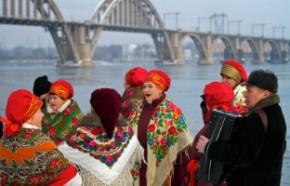Borderland speech

In early March the Ukrainian men’s national soccer team played a match against the United States. Scheduled long before the political upheaval in Ukraine, the game (moved to Cyprus for security reasons) began as usual with the playing of national anthems. The members of the Ukrainian team stood with their arms wrapped around each other and sang the Ukrainian national anthem in Ukrainian. Later, at a press conference the coach spoke about Ukrainian unity and solidarity—in Russian.
Ukraine is a borderland between West and East, a confluence of languages and cultures. Russian president Vladimir Putin has sought to exploit language difference as he seeks to exert control over Ukraine. When the Ukrainian parliament, in one of its first acts following the ouster of Viktor Yanukovych as president, repealed a 2012 law that allowed the use of Russian as an official language, Moscow asserted that Russian-speaking Ukrainians were in danger and used the parliamentary action as part of an excuse to invade Crimea. But acting president Oleksandr Turchynov refused to sign the bill into law and urged an immediate redrafting that would take minority languages—Russian, Hungarian, and Romanian—into account.
As this tussle demonstrates, language is a key to power. Maintaining Ukrainian as the official language is important for Ukrainians who were persecuted for speaking their language during times of Russian and Soviet domination.




